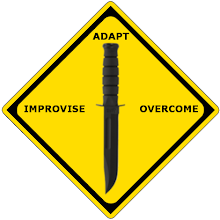Note: Forward to 1:20 to skip the intro. This is NOT a fear mongering crack-pot video about 2012, it is filled real world practical advice
A quick overview of the Top Ten things to consider in preparing for Surviving 2012.
Tags: * economic * collapse * survival * surviving * 2012 * prepper * preppers * preps * health * medicine * mind * body * stress * income * unemployment * skills * water * purification * guns * rifles * ammo * barter * food * storage * canning * growing * gardens * raising * animals
It makes no difference what you are prepping for, a SHTF scenario, natural or man made disaster, you need to put together a disaster preparedness kit and checklist to give you and your loved ones a greater chance of survival. It is recommended that you prepare your family to be self-sufficient and self-reliant for at least three days to a week - Keep in mind these suggestions are only Bare Minimum!
Some suggested Preps:
Water:
Store one gallon per person per day. Two quarts for drinking and two quarts for cooking.
Food:
You should have enough non-perishable foods on hand that your family can survive on for at least three days to one week.
Your food items should require no:
- Refrigeration
- Preparation or cooking
- Little or no water
Choose foods that are compact, nutritionally dense, and have a long shelf life.
Cooking:
You should also have several alternative methods for cooking -
- Camp stove/ w Extra Fuel
- Barbecue Grill
- Open Fire
Bug Out Bag, Go Bag, 72 Hr Kit Contents:
- Mess Kit: Plates, Cups, Utensils
- Emergency Preparedness Manual / Survival Manual
- Battery Operated /Manual Crank Flashlight & Radio / w Extra Batteries
- Waterproof Matches / Lighter / Fire Steel
- Candles, Battery Operated Lamps, Lanterns /w Extra Lantern Fuel
- Medical Kit / w First-Aid Manual
- 30 Day Supply of your Prescription Medication if needed
- High Quality Vitamin Supplements
- Can Opener / P-38
- Survival Knife & Camp Axe
- Aluminum Foil
- Garbage Bags / Ties
- Important Documents
- Ample Cash
- Tent / Sleeping Bag / Wool Blankets / Sleeping Mat
- Change of Seasonal Clothes per Person
- Multi-Tool
- Duct-Tape
- Compass
- Water Filter / Water Sanitation Tablets
- Extra Bottled Water
- Canteen / w Metal Cup
- Ziploc / Plastic Bags / Plastic Containers
- Signaling Devices
- Needle & Thread
- Heavy Water Proof Tarp / Drop Cloth/ Plastic Sheeting
- Paracord / Rope / Twine
- Up to Date Local Map
- Sanitation / Personal Hygiene Items
- Feminine supplies
- Soaps / Detergents
- OTC Medicines / Pain Relievers / Antacids / Anti-diarrhea
- Extra Pair of Boots or Shoes / Wool Socks per Person
- Work Gloves
- Rain Gear
- Hats / Gloves
- Sunglasses / Extra Prescription Glasses / Contact Lenses and Supplies
You should have all your important documents organized during normal times; during disasters (man made or natural), you will want to make it a priority. Use this checklist to assemble your documents and make sure they're all up-to-date. You may want to keep some documents in a safe deposit box, fire-proof safe or other secure location. If so, keep copies handy for easy access and take them with you in the even of a disaster.
- Financial Statements
- Bank address and phone number (include all account numbers)
- Retirement accounts name, address, phone numbers
- Credit card numbers and expiration dates
- Birth certificates
- Marriage certificates
- FOID Cards
- Divorce decrees
- Passport
- Citizenship papers
- Adoption papers
- Social Security Cards
- Drivers Licenses
- State and Federal Tax Records
- Fire, Homeowners, and Renters insurance policies
- Life insurance policies
- U.S. Savings Bonds, stocks, securities, deeds and mortgages
- Car title and registration
- Automobile insurance Policies / Cards
- Last will and testament
- Extra set of house and car keys
Considerations for your pets
- Names and descriptions of any pets
- Veterinarian's name, address and phone number
- Extra Food & Water for your pets
Considerations for small children & babies:
- Canned or Powered Formula
- Diapers & Wipes
- Bottles & Nipples
- Powered Milk
- Baby Food
- Medications & Ointment
- Entertainment: Games & Books
Other considerations would include:
- Alternate methods of communications should land lines, cell phones, and internet go down, some suggestions might include battery operated walkie talkies / 2 way radios / FRS/GRS radios etc.
- Alternate evacuation routes and modes of transportation.
- Pre-determined Rendezvous points / Meeting Places.
Labels: Bug in, Bug Out Bag, Bug Out Location, Prepare, Preparing, Prepper, Preppers, SHTF, SHTF Scenario, Survival
Its not just could you leave loved ones behind but would you want to survive without them. The Humanity factor is something most don't consider when training for "bug out scenarios". Asking yourself the hard, dark questions. And could your morality allow to do abandon your friends and family only to out survive them alone.
Labels: Bug Out Bag, Bug Out Location, Preppers, SHTF, SHTF Scenario, Survival
Vacuum Seal a Mason Jar with a Handcrank Pump - Food Storage SHTF Survival Prep
How to seal a mason jar WITHOUT an electric vacuum sealer.
I didnt need a big expensive Foodsaver Electric Vacuum Sealer. This automotive vacuum pump and wide mouth mason jar sealer works well for the one thing i need it for... sealing food for storage in glass jars.
This is also good for disaster preppers and SHTF food storage that works even when the electricity goes out.
survival food storage prep prepper this week shtf survivalist preparedness natural disaster zombie attack dehydrated tomatoes
Tags: shtf survival preparedness preppers disaster survivalist prep
Labels: Preppers, SHTF, Survival, Survivalists


 Subscribe
Subscribe